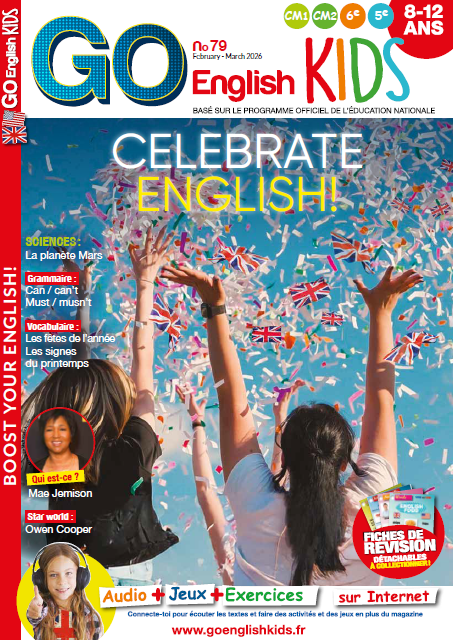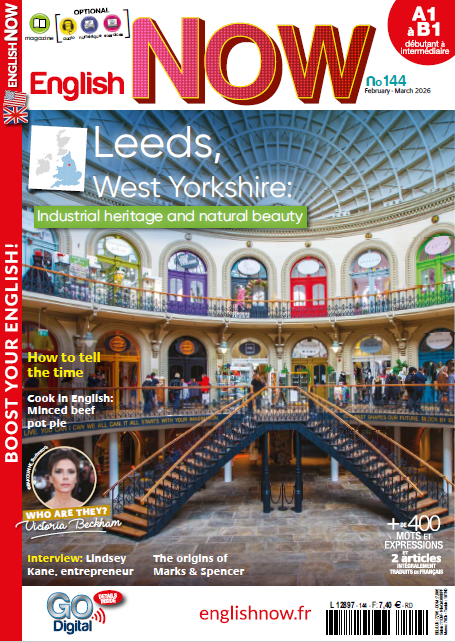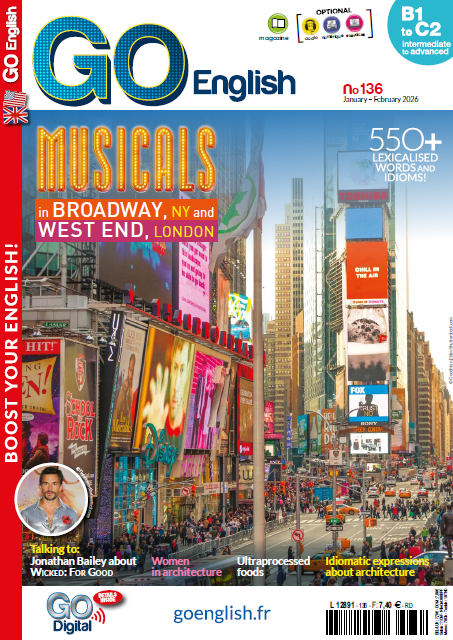- Menu
-
Blog
Actualité anglophone
Le monde anglophone, sa langue et sa culture vous intéressent ? Pour satisfaire votre curiosité, suivez notre blog et retrouvez un nouvel article chaque semaine : recettes, idées voyage, culture, actualité, etc.
➞ Cliquez ici
- Abonnements
- Couplage
- Numérique + audio
- Autres produits
- Accès abonné
- Espace prof
-
Qui sommes-nous
Votre partenaire pour les langues
Créée en 1996, la société d’édition presse Entrefilet est le spécialiste de l’apprentissage du français langue étrangère (avec la gamme Bien-dire) et de l’anglais (avec la gamme Go English).
-

THE GRAMMAR POINT from Go English no106
‘The’ – Part 1 (B1-C2)
It is the most common word in the English language – but it is also the grammatical form whose use has the most rules and exceptions.
Uncommonly complicated
It can sometimes seem to English learners that whoever invented English planned for it to be as difficult to learn as possible. A case in point is the definite article ‘the’. It is the most common word in the English language – but it is also the grammatical form whose use has the most rules and exceptions. Either the inventors of the language were ungracious and vindictive, or they just had a very unpleasant sense of humour!
Certainly, the basic rules for the use of the definite article are simple: it must go before common nouns that we have mentioned before or which are familiar to the person we are speaking to, and it doesn’t go before proper nouns...except for all of the exceptions!
Properly complicated
In this article, we’ll be looking at the rules and exceptions that are not related to common nouns, but to proper nouns, in particular the names of cities, continents, mountains, lakes and other geographical entities.
Continents
No article is ever used with the name of a continent.
The Great Plague was the source of many nursery rhymes in Europe. (not ‘in the Europe’)
Cities
Similarly, we don’t use articles with the names of cities.
Mumbai was founded by the British.
The only exception to this rule is ‘The Hague’.
Countries
In most cases, we don’t put a definite article in front of the names of countries.
The novel The God of Small ThinGS is set in India (not ‘the India’).
However, when the name of the country includes words like ‘republic’, ‘states’, ‘kingdom’ or ‘union’, it is preceded by the definite article.
The United Kingdom ruled India directly for almost 100 years.
Islands and lakes
Groups of islands usually take the definite article.
The British Isles aren’t known for their tasty cuisine.
Individual Islands, however, don’t take an article.
Sri Lanka, which is an island not far from India, was also part of the British Empire.
The same is true of lakes: they don’t take an article.
Vembanad is the longest lake in India.
Other bodies of water
Rivers, canals, oceans and seas, on the other hand, always take an article.
The English word for ‘India’ is based on the country’s most important river, the Indus. The Indian Ocean stretches from Bangladesh all the way to the coast of Madagascar.
Mountains
By the same token, groups of mountains – also known as mountain ranges – always take a definite article.
Kashmir, which is located in the Himalayas, has been a source of conflict between India and Pakistan ever since the Partition.
However, individual mountains don’t take an article.
Mount Blanc is the highest mountain in the Alps.
Regions
Regions (such as the Middle East, the Midwest and the Midlands) usually take an article.
The Indian subcontinent is comprised of the modern nations of India, Pakistan and Bangladesh.
However, when defined by adjectives (example: northern, eastern, central, etc.) they don’t take an article.
Northern India saw some of the bloodiest clashes of the Partition.
Article by Mohamed Oummih
Ce site Web utilise ses propres cookies et ceux de tiers pour améliorer nos services et vous montrer des publicités liées à vos préférences en analysant vos habitudes de navigation. Pour donner votre consentement à son utilisation, appuyez sur le bouton Accepter.
Plus d'informationsConfiguration des cookies
- Cookies tiers à des fins d'analyse.
- Afficher des recommandations personnalisées en fonction de votre navigation sur d'autres sites
- Afficher des campagnes personnalisées sur d'autres sites Web
- Nécessaire pour naviguer sur ce site et utiliser ses fonctions.
- Vous identifier en tant qu'utilisateur et enregistrer vos préférences telles que la langue et la devise.
- Personnalisez votre expérience en fonction de votre navigation.




